Human neuron differentiation and phenotyping service
The Human Neuron Core provides human neurons derived from induced pluripotent stem cell (iPSC) lines. We currently offer production of NGN2 cortical neurons, iGABA neurons, iPSC-derived NPCs, 3D Spheroid Motor neurons, 63-day 3D patterning cortical neurons, inner ear organoids, 3D sensory neurons, 35-day 3D accelerated cortical neurons.
The Core can also identify and consent patients at Boston Children’s to create cell lines modeling specific diseases to support translational research collaborations.
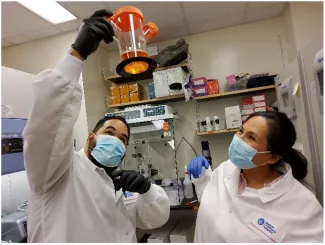
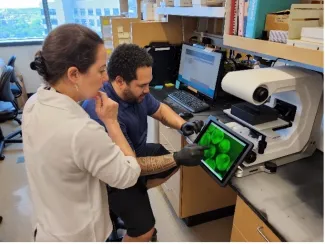
Our phenotyping services can compare key cellular characteristics across patient-derived and control-derived neurons. We routinely carry out neurite outgrowth quantification using phase and antibody-based methods, we can mature neurons so they express synapses and we quantify the number of synapses between disease and control. We can facilitate various types of assay development for targeted pathways using variety of imaging methods and level of resolution. We can image 3D organoids using our newest high-throughput microscope, Opera Phenix, and we are currently optimizing clearing methods for antibody-based assays in 3D. We also provide data analysis and script development services for Incucyte, IXM, and Opera Phenix. We offer electrophysiological profiling for those interested in functional cell assessment with high-throughput Maestro pro multielectrode array technology.
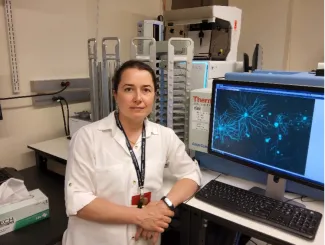
Axion Maestro-Pro Multi-electrode array (MEA) with neuronal, cell viability and cardiac modules.
The Maestro Pro multielectrode array technology (Axion Biosystems) offers a full environmental control and enables analysis of neural networks and electroactive tissue at unprecedented throughput and scale. The additional module of cell viability enables the evaluation of the electrode coverage. This system is ideal for large-scale cellular analysis in drug screening applications and for phenotyping human neurons. The array has 768 stimulating and recording electrodes and accommodates 12-, 48- and 96-well assay formats.
Equipment may be rented hourly or hired for assisted use through trained core technicians.
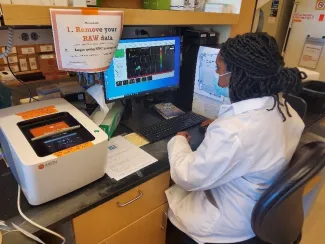
Assay development and screening facility
This high-throughput, high-content bioassay laboratory gives you the ability to explore disease-related cellular processes and molecules. Equipment is avail- able via hourly fee-for-usage. We can provide research assistants on an hourly basis to assist with assay development and drug screening, as well as access to a curated collection of bioactive compound libraries for screening.Remove old image
The Opera Phenix® Plus High-Content Screening System is the premier confocal solution for today' most demanding high content assays using complex disease models, such as live cells, primary cells and microtissues, and fast-response assays, such as Ca2+ flux. The innovative optical design lets you generate richer information through extremely sensitive confocal imaging and at higher throughput than ever through simultaneous acquisition. Because spectral crosstalk is reduced to a minimum, it delivers speed without compromising sensitivity. With proven automated water immersion lenses, you’ll achieve higher throughput and richer content, making it the ideal high-content screening system for discriminating phenotypes and studying complex disease models. Current configuration includes:
- Environmental control - temperature, CO2, and humidity
- Liquid handling module is compatible with brightfield imaging
- Four large format sCMOS cameras with simultaneous acquisition in up to four channels
- Five lasers
- Water immersion objectives 20x, 40x and 63x, and air objectives 5x, 10x and 20x, and
- Spinning microlens disk with increased pinhole-to-pinhole distance to further reduce out-of-focus noise in thick samples such as 3D organoids and microtissues
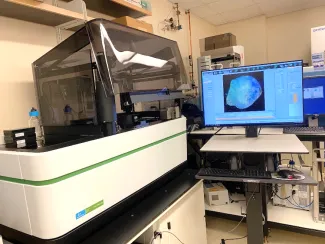
The ImageXpress® Micro Confocal system is a high-content solution that can switch between widefield and confocal imaging of fixed and live cells. It can capture high quality images of whole organisms, thick tissues, 2D and 3D models, and cellular or intracellular events. The spinning disk confocal and sCMOS camera enable imaging of fast and rare events like cardiac cell beating and stem cell differentiation. With MetaXpress software and flexible options like water immersion objectives to choose from, the system enables many confocal imaging applications from 3D assay development to screening.
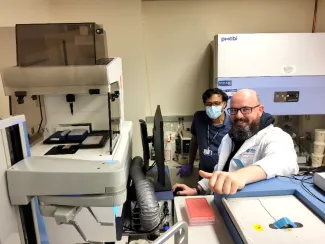
ArrayScan™ XTI: High content screening with live cell imaging
The ArrayScan XTI (ThermoFisher Scientific) features a temperature- and CO2-controlled live cell chamber to assay cell biology over several days. An integrated liquid handler administers compounds well by well, capturing real-time changes in fluorescence with speeds up to 10 Hz with an enhanced. CCD camera and seven-color LED light source, using 6-well to 384-well labware. The instrument is ideally suited for automated image analysis of many cell types, particularly heterogeneous cell preparations that may require detection of co-expressed markers to identify subsets of cells.
Hamamatsu Functional Drug Screening System
The Hamamatsu FDSS7000EX can use fluorescence or luminescence to enable a multiplicity of dynamic cellular assays, including measurements of gene expression levels, changes in membrane potential or concentrations of intracellular ions, such as Ca++. Assays can be carried out in primary neurons, stem-cell-derived neurons, trans-differentiated neurons and cell lines in a fast, accurate, parallel fashion.
Robotics and liquid handlers
The Human Neuron Core has a wide range of small robotic dispensers and liquid handlers to automate preparation of samples in 96- and 384-well plates. Applications include tissue culture, preparation of compound plates and PCR plates and immunohistochemical staining of fixed cells.
